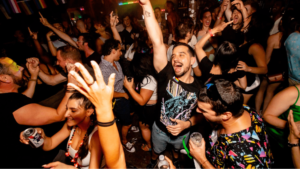Why all the fuss about marketing events to Millennials?
Millennials, that cohort of 18-34 year olds, are rapidly reshaping how we access information, our consumption of goods and services, and even where and how we work.
They have grown up through a global economic crisis and this, combined with technological advances, has impacted their view of the world. In particular, they’re less material and more driven to find novel experiences.
They’re also, demographically speaking, an economic powerhouse.
This is backed up by a previous study that found that Millennials want experiences more than anything, and they have the money to spend.
In fact, the study, conducted by IPSOS on behalf of Eventbrite, found that Millennials spent a staggering “£419,556,233 each month on attending live events.”
To help organisers find the most effective channels for reaching experience-hungry Millennials, Eventbrite surveyed 1,000 recent event attendees, asking them how they found out about the last event they had attended.
Our Event Discovery Britepaper also unearthed answers to other demographic questions, such as whether gender or location affects how attendees search for event experiences.
The survey responses cover the whole spectrum of events, from business networking to gigs and food festivals. Respondents also gave details on the media or channel they used to find out information on the event.
The Britepaper revealed generational differences in how information on events in accessed – worth bearing in mind if you are targeting a specific age group such as Millennials.
So what’s so different about marketing to Millennials?
The younger members of Generation Y (as Millennials are also known) have never known a world without ubiquitous Internet and Wi-Fi, while the older Gen-Y’ers have to stretch their collective memories to remember a time before they could get online, even if it was through dial up modems.
Unlike previous peer groups, they have grown up alongside smartphones and tablets, and have been one of the earliest and most eager adopters as new technologies are released.
Millennials are the first generation to find the answers to their questions any time, any place and, for most of the UK, anywhere.
And in fact, our study did show that for the digitally connected generation, Facebook is the most important channel for event discovery, with nearly half (48%) of all Millennials citing it as the place they discovered their last event experience.
So you might be forgiven for thinking that it’s pointless to look beyond mobile and online to reach this audience. However you’d be wrong.
Don’t ignore traditional media – Millennials don’t
Our Britepaper findings show the importance of challenging the always plugged-in stereotype, with nearly a third finding out about events from offline channels.
Across the entire survey, ‘word of mouth’ was ranked second most important way to learn about upcoming events (19 per cent) above Twitter (9 per cent), Email (8 per cent) and Google (4 per cent). You don’t get much more analogue than word of mouth.
While Millennials are considered to be early adopters of technology, one of the biggest surprises of our survey was that this wasn’t the case in terms of newer social media channels – at least not yet.
Our Britepaper found that just 3.5 per cent of Gen Y respondents discovered their last event through Instagram, Pinterest and Snapchat combined.
Contrast this against the 8 per cent of Millennials who said they gained information on events through traditional offline media, namely posters, flyers and magazines. This puts them on a par with Twitter and email in importance.
The findings also chime with our Eventbrite Pulse Report (a survey of over 500 event organisers), where we discovered that, contrary to popular opinion, print marketing is far from dead. In fact, the industry trends report found that 25 per cent of organisers planned to increase their print marketing budget this year.
How else can you market your events to Millennials?
In ‘Marketing to Millennials: Reach the Largest and Most Influential Generation of Consumers Ever’, authors Jeff Fromm and Christie Garton lay out a detailed strategy for any business to win over Millennials as consumers.
Here are three of the top tips event organisers can utilise.
Listen: Millennials want to be heard, and typically take to social media not to consume brand messages, but to talk with friends, ask questions and share their experiences – both good and bad.
If event organisers use social media only as a place to consistently promote their events with a one-note sales message, it’s very unlikely an audience of Millennials will be listening to you.
Instead, you need to make sure you engage with them on their favoured platforms by answering their questions, showing your sense of fun and values, asking for their feedback and occasionally incentivising their engagement with exclusive, well thought through and targeted offers.
Participation: Millennials are not just passive consumers, and they like to feel ownership of the products and experiences they’re interested in. You just have to look at the success of Lego to see how a participation mind-set can transform the fortunes of a brand.
As an event organiser, you can tap into this desire to shape their own experiences and be co-creators by asking for their feedback on agendas, voting for their favourite bands to appear, running competitions on ideas to make it more eco-friendly or anything else that would allow your audience to have meaningful involvement with the end result.
Make them look good: Millennials are very image conscious, and not in a vain way. They understand the power of personal branding and online reputation. They’re incredibly well-connected, and most of their online conversations take place in public (although the advent of private messaging services may start to shift this).
However it’s obvious that Facebook and other online social networks are places to show your best self, so event organisers would do well to be mindful of this and provide their audience opportunities to look good in front of their digital networks.
Whether it’s exclusive or fun photo ops at the event, cool giveaways, or interesting/unusual status updates, events need to find ways of encouraging their Gen-Y attendees to share their experiences by making them look good.
Conclusion
While established digital networks such as Facebook and Twitter should top the priority list of your event marketing strategy, it’s vital not to overlook offline channels either.
Print clearly still has a role to play in event discovery amongst Millennials, and the increased investment from organisers shows that it works.
The importance of word of mouth also shouldn’t be underestimated, and so you should do what you can to encourage ticket buyers to tell their friends that they’re attending your event.
All in all, reaching Millennials can seem like hard work, but they’re an audience worth fighting for.





